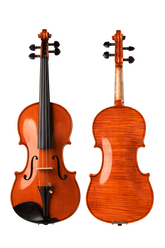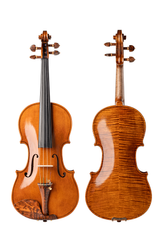Handmade Violins vs. Factory Violins in My Eyes
Are factory violins just garbage? What are the differences between factory violins and handmade violins? Beginners often have many questions about whether to use factory or handmade violins. In this article, I will describe my perspective on both.

I. Common Sources of Violins on the Market
- Master-Made Handmade Violins
Historically, the names of Stradivari and Guarneri have been unmatched. The violins they crafted can fetch astronomical prices at auction. Today, there are many violin masters around the world whose handmade violins can also be worth tens of thousands of dollars. Each violin is meticulously crafted by the master, showcasing not only their exceptional skills but also their understanding and pursuit of art and music. Undoubtedly, these handmade violins are not suitable for beginners; they are designed for professional violinists.
- Studio-Made Handmade Violins
Many violin-making studios exist, often comprising multiple luthiers who collaborate seamlessly to create a violin. Alternatively, a renowned master may oversee the studio while individual luthiers craft the instruments. The price of these violins is significant; a studio typically produces only a few hundred violins a year, with prices ranging from several thousand to tens of thousands of dollars. These studio-made violins are more suitable for those with some playing experience. At Fiddlover Violin Shop, our Fine Violin series features handmade violins, crafted from high-quality wood that has been naturally dried for over ten years and meticulously adjusted and selected by luthiers. If you're interested in purchasing, you can check out the Fine Violin series, which includes classic Stradivari 1716 models and the Guarneri 'del Gesù' models favored by many.
- Factory Violins
The emergence of factory violins is a historical necessity. As violins became more popular, the demand from beginners increased. To meet this growing market, factory violins were produced. These violins are made from bulk-ordered wood and manufactured in large quantities at low prices; a factory can produce tens of thousands of violins in a year. However, the quality of factory violins cannot compare with that of handmade instruments. Despite this, their low price maintains a substantial market demand, and many violins available on platforms like Amazon for under a hundred dollars are produced this way. I do not recommend beginners use such instruments for learning, as it may lead to a poor start. However, if the violin is merely for fun, it could be acceptable.
- Fiddlover's Beginner Violin Series
Fiddlover's beginner violins are handmade, employing traditional Italian violin-making techniques. Every step, from selecting materials to crafting the top and back, shaping the sides, carving the scroll, making the bridge, and hand-finishing, is performed by experienced craftsmen. The quality of these violins is stable, and their performance is reliable, making them suitable for beginners. I highly recommend the Fiddlover Q033 beginner violin, which is ideal for new players. You can click on Q033 violin to learn more.
II. Differences Between Handmade and Factory Violins
- Wood Quality Handmade violins are crafted from carefully selected high-quality wood to meet specific requirements. In contrast, factory wood is purchased in bulk, resulting in varying quality. Consequently, the wood used in factory violins can differ significantly, with some being excellent and others subpar.
- CraftsmanshipHandmade violins allow for adjustments during the crafting process, resulting in finer craftsmanship. Factory violins, while more standardized, often lack the attention to detail that handmade instruments possess.
- Sound Quality handmade violins can produce an exceptional sound that is rich in expression and emotion, though each one is unique and may vary. Factory violins tend to have more consistent performance, but one shouldn't expect them to produce remarkable sound quality.
- Components Handmade violins can be paired with specific strings and bridges based on the instrument's characteristics to maximize their potential. Factory violins typically use standardized components, so to improve performance, adjustments must be made, which can be challenging for beginners.





